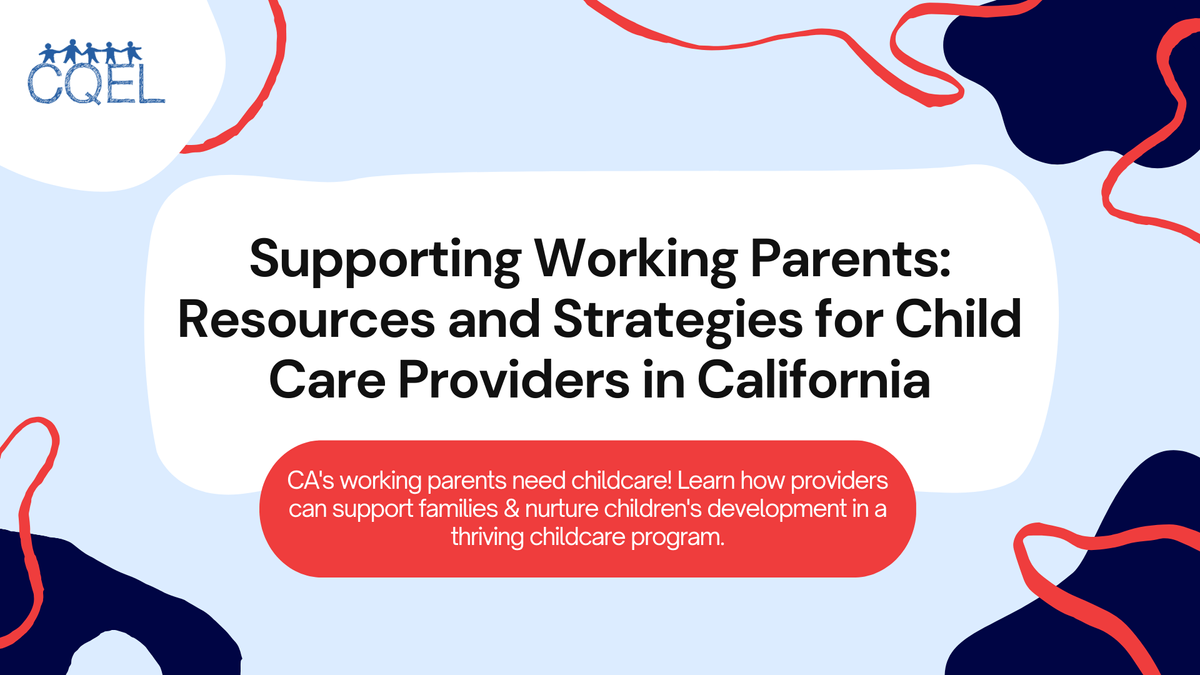Supporting Working Parents: Resources and Strategies for Child Care Providers in California
CA's working parents need childcare! Learn how providers can support families & nurture children's development in a thriving childcare program.

California boasts a thriving workforce, and a significant portion of that workforce comprises working parents. Childcare providers play a crucial role in supporting these families, offering a safe, nurturing environment where children can learn and grow while their parents are at work. Understanding the unique needs and challenges faced by working families is essential for creating a childcare program that truly complements their busy lives. By fostering strong partnerships with working parents, childcare providers can contribute significantly to their well-being and the overall development of children in California.
Working parents juggle a multitude of demands – managing work deadlines, household responsibilities, and the constant pressure to balance their careers with quality time for their children. Time constraints and stress are constant companions, and childcare providers who appreciate these realities are better positioned to support them. Understanding preferred communication styles is key. Busy working parents might appreciate quick updates via mobile apps or online portals, while others may prefer a more traditional phone call approach.
Flexibility and reliability are paramount for working parents. Offering extended hours, before and after school care, or even drop-in options can make a world of difference in accommodating diverse work schedules. Imagine the peace of mind a parent experiences knowing their child is in a safe and stimulating environment, regardless of their unpredictable work hours. Similarly, ensuring reliable care, with minimal disruptions or unexpected closures, allows parents to focus on their work commitments without constant worry.
There are several strategies childcare providers in California can implement to create a supportive environment for working families. Offering flexible scheduling options is a significant first step. Consider extended hours, before and after school care, or even drop-in options to cater to diverse work schedules. Clear communication is vital. Regular updates regarding daily activities, developmental milestones, or any schedule changes keep parents informed and alleviate anxieties. Utilizing online portals or mobile apps can streamline communication and make information readily accessible for busy working parents.
Building trust and strong relationships with working families is fundamental. Open communication, active listening, and a willingness to address their concerns are essential. Consider hosting regular parent-teacher conferences or workshops to foster collaboration and build a sense of community within your program.
Fortunately, there are valuable resources available to support California childcare providers in their mission to empower working families. The California Child Care Resource and Referral Network (CCRRN) offers a wealth of information, including funding opportunities, training programs, and connections with other childcare providers in the state (https://www.cdss.ca.gov/inforesources/child-care-and-development/quality-improvement-initiatives/resource-and-referral)). The California Department of Education's Child Development Licensing division provides vital information on regulations, licensing requirements, and best practices for childcare providers in California (https://www.cdss.ca.gov/inforesources/child-care-licensing).
Beyond the practical considerations, cultural competency is crucial. California is a diverse state, and childcare providers who understand the unique needs and customs of families from various backgrounds are better equipped to provide culturally sensitive care. Working parents often face significant stress due to demanding work schedules. Recognizing the potential impact on their mental health and well-being allows childcare providers to create a supportive environment for the children in their care. Consider partnering with local community resources to offer additional support services for working families, such as transportation assistance or mental health resources.
By understanding the challenges faced by working parents, implementing supportive strategies, and utilizing available resources, childcare providers in California can create a nurturing environment that complements busy family lives. Building strong partnerships with working parents fosters trust, alleviates anxieties, and ultimately contributes to the well-being of both children and their families. Aspiring childcare providers who embrace this responsibility play a vital role in supporting California's workforce and the healthy development of future generations.
